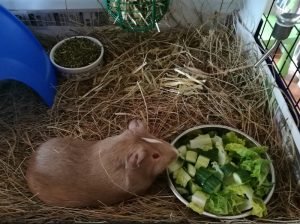
Taking care of guinea pigs involves a number of well-considered aspects, including guinea pig habitat (indoor cage or outdoor hutch), guinea pig food and diet, guinea pig toys and accessories to keep them entertained and exercised, as well as grooming and occasional vet care.
To ensure your guinea pig pets remain happy and healthy, they need your commitment to regular attention.
Guinea Pig Housing
Aside from having the appropriately sized indoor guinea pig cage (or outdoor hutch) with the appropriate ventilation and temperature control, enclosures should be prepared as follows:
- Line the base with newspaper – it is best to ensure that the ink used for printing does not contain chemicals that are potentially harmful to your guinea pigs in case they bite and chew on it.
- Add with a layer of pet bedding, commonly paper or wood based, as well as hemp based nowdays. This absorbent material is required to soak up the urine from your guinea pig pets and ensure that the top layer that your guinea pigs are in direct contact with is kept dry. We have tried a number of different products over the year – please click here to read about our experiences.
- Top with a layer of soft hay to provide cushioning to prevent foot injuries. This layer of hay acts as both bedding and a source of food required in your guinea pig diet. As guinea pigs are prone to respiratory problems, please do not use sawdust or wood shaving. Straw is also not a good option as it is not good at absorbing urine and can have hard stalks that can cause injuries to your cute guinea pigs.
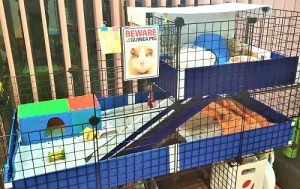 We’ve sectioned our guinea pigs enclosure into feeding areas and play areas. For the “play areas’, we’ve bought vet beds which are luxuriously soft thick fleece surface which allows the urine to pass through to the base keeping the top layer nice and dry at all times. We use old towels, unwanted clothing or puppy training pads as the absorbent lining underneath the vet bed.
We’ve sectioned our guinea pigs enclosure into feeding areas and play areas. For the “play areas’, we’ve bought vet beds which are luxuriously soft thick fleece surface which allows the urine to pass through to the base keeping the top layer nice and dry at all times. We use old towels, unwanted clothing or puppy training pads as the absorbent lining underneath the vet bed.
Guinea pigs require a soft, clean and dry surface at all times to ensure optimum health. Daily spot cleaning is recommended and bedding changed as required (in some instances it can be daily). Depending on your guinea pig cage set up, a complete enclosure clean is required at least every 1-2 weeks.
UPDATE: We have in the last couple of months tried Guinea Dad bamboo fibre fleece bedding and it’s amazingly absorbent and super cosy. We opted for the version with hidey pocket at one end and our guinea pigs love it! So coupled with the super absorbent Minihemp product, the cage remains fresher and odour free between complete cleans. Our cleaning time has also cut down from nearly 5 hours to under 2 hours.
Guinea Pig Diet
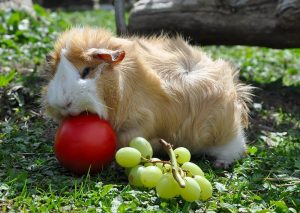
Guinea pigs are herbivores with an insatiable diet. They love to eat and create lots of magic pellet-like brown beans. To keep them happy and healthy they need a good guinea pig diet. So, what do guinea pigs eat? More importantly, what can guinea pigs eat?
Guinea pig food should include:
- A constant source of good quality grass or grass hay, e.g. Timothy, Wheaten, Oaten, Pasture, Paddock, Meadow or Ryegrass hays. It encourages chewing for a long time, which helps wear down their teeth, which grows continuously. They should not be fed foods that are too high in protein and calcium, such as alfalfa or clover hays. Grass or grass hay is the basis of the guinea pig diet, which is very important for maintaining good dental and gastrointestinal health.
- A daily supply of fresh leafy green vegetables and herbs. Vegetables safe for guinea pigs to eat include kale, broccoli, cos lettuce (the only variety guinea pigs can eat safely), capsicum (must remove seeds), celery, pumpkin (must remove seeds), Bok Choy and other Asian greens. Carrot tops can also be given as an occasional treat. Herbs that guinea pigs can eat include parsley, coriander, basil, dill and mint. Vegetables and herbs should be limited to one cup a day per adult guinea pig.
- A daily offering of high quality guinea pig pellets, to provide additional nutrients and ideally fortified with Vitamin C. Guinea pig pellets should be given in small quantities of no more than a ¼ cup per adult guinea pig.
- Small quantities of Vitamin C rich foods such as kiwifruit (without the hairy brown skin) to supplement the guinea pigs’ dietary requirement of Vitamin C. Vitamin C is usually sufficiently supplied by the fresh vegetables, however a small supplement once or twice a week can be beneficial. With capsicums, the red variety has highest content of Vitamin C.
- Some offering of fruits as treats, such as grapes, apples, watermelon and strawberries.
- A constant source of fresh water at all times. Your guinea pig cage must be fitted with a water bottle. A water bowl can be provided as well at least in the initial stages until your guinea pig pets learn to drink from the water bottle. Guinea pigs need about 100ml of fluid (fresh water) a day, however they may not drink that much if they are getting sufficient fluid from the fresh food supplied.
With drinking, the water bottle this is the most hygienic method. Initially, we provided both water bottles and water bowls. However, we soon found the guinea pigs used it as the toilet bowl and splash pool. Once our guinea pigs were relatively used to us and tamed to a certain extent, we were able to get the water bottle nozzle and dripped water close to their mouths. Guinea pigs are very clever creatures and they soon worked out how to drink from the water bottle. From this point onwards, we removed the water bowl and said goodbye to dirty water.
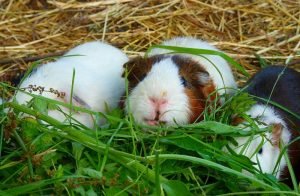 As to the food bowls, good solid ceramic ones work best; otherwise the guinea pig will literally throw food at itself by stepping on the bowl and flipping all the food up. Our Popcorn was great at doing that.
As to the food bowls, good solid ceramic ones work best; otherwise the guinea pig will literally throw food at itself by stepping on the bowl and flipping all the food up. Our Popcorn was great at doing that.
Guinea pigs are neophobic creatures, which means they develop a strong preference for particular food type in the first few days of life. If you have a baby guinea pig, it is a good idea to feed a range of food types from an early age. If your guinea pigs are adult guinea pigs like ours from a rescue shelter, don’t be alarmed if they don’t initially eat certain foods. Introduce new foods to your guinea pig slowly over a period of weeks.
There are a significant range of foods that are harmful to guinea pigs and should not be offered to them. Please click here to check out the list of what not to feed your guinea pigs.
Guinea Pig Grooming
Grooming your guinea pig is a wonderful opportunity to bond with your cute pets.
If you have a long-haired guinea pigs, daily grooming is recommended to help keep their coats in good condition. Using the appropriate pet hair brush, gently remove loose hairs, tangles, bits of hay, etc. Take the chance to also check your guinea pigs for any signs of parasites and also check the length of their teeth and toenails. Guinea pigs have nails and teeth that grow continuously.
Untreated wooden lounging logs are excellent not only as a hiding place, but also provides chewing surfaces to grind down their continuously growing teeth. Toenails will also need to be clipped if found to be too long. It needs to be done extremely carefully in fear of trimming their toes. It is best to have your guinea pigs’ toenails clipped by the vet.
Guinea Pig Exercise
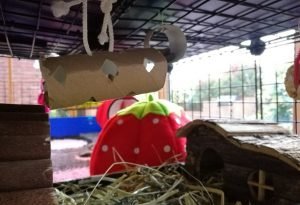 Guinea pigs need space to exercise on a daily basis.
Guinea pigs need space to exercise on a daily basis.
In the guinea pig cage or enclosure, provide some tunnels or logs that they can run through or climb, to encourage movement and alleviate boredom.
If at all possible outside playtime in a grassy area, safe from predators is ideal. This provides fresh air, natural sunlight and good access to fresh grass.
Indoor floor time to bond with your guinea pigs is also important. The play area needs to be a safe defined area free from electrical cords and the like, as guinea pigs love to chew and may nibble at them.
Daily handling your guinea pig helps develop its confidence and encourage it to become friendly and sociable.
Guinea Pig Health Problems
With good living conditions and a healthy diet, most of the common health problems with guinea pigs can be prevented.
Guinea pigs can be susceptible to respiratory infections and skin conditions, if they are exposed to unhygienic conditions. Like most pets, guinea pigs can also susceptible to fleas and mites. Ringworm infection is also a common infection in guinea pigs and is contagious to humans and other animals. Please get help from a vet that is familiar with guinea pigs with any of the above problems.
Guinea pigs do not require vaccinations and with a good environment and balanced diet, they remain healthy and happy. Regular health check-ups annually are still recommended to ensure prevention of any health issues for your guinea pig.
De-sexing of Guinea Pigs
De-sexing of guinea pigs is recommended, as it can reduce the likelihood of serious diseases in cavies and also ensures a calmer temperament in your guinea pigs. Guinea pigs can start breeding at 6-8 weeks, with most females having had their first litter before 6 months of age. After this age, the pelvic bones in sows become fused and create complications during labour. Guinea pigs can be desexed at 5-6 months of age.
Enjoy taking care of guinea pigs. It is most rewarding and your guinea pigs will thank you for it.
